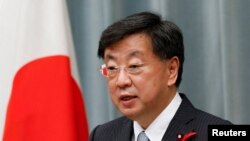Japan is planning to establish a new framework to provide defense aid to “like-minded” countries, a move analysts say highlights Tokyo’s intention to play a more active role in regional security amid the growth of Chinese influence.
Tokyo’s move to establish an Overseas Security Assistance (OSA) program is Japan’s first departure from its own restrictions that banned the government from using international aid for military purposes.
The OSA will provide nonlethal material and equipment, as well as assistance for infrastructure development, based on the security needs of the countries receiving the aid.
The new program is to “enhance the security and deterrence capabilities of like-minded countries in order to prevent unilateral attempts to change the status quo by force, ensure the peace and stability of the Indo-Pacific region in particular, and create a security environment desirable for Japan,” said an April 5 statement by Ministry of Foreign Affairs of Japan.
Japan seeks bigger role, say observers
For decades, Japan’s Overseas Development Assistance (ODA) program has funded roads, dams and other civilian infrastructure projects, Chief Cabinet Secretary Hirokazu Matsuno said at a news conference on April 5. The new program will operate as a new entity.
Lu Hsin-Chi, director of the Center for Japan and Korea Studies at National Chung Hsing University in Taiwan, believes the new initiative shows the Japanese government intends to play a bigger role in securing regional security and strengthening the U.S.-Japan alliance.
"China and Russia are the major concerns of the U.S. Indo-Pacific strategy. As an American ally, Japan is taking that into consideration when formulating its own defense policies,” he told VOA Mandarin via Line video on April 9. “The regional influence of China and Russia will determine the importance of Japan’s role in the U.S.-Japan alliance. The bigger their influence, the more important Japan will be.”
A breakthrough
Wang Yen-Lin, an assistant research fellow at the Institute for National Defense and Security Research in Taiwan, said that for decades, Japan’s foreign aid was aimed at creating an economic environment favorable to Japan.
“The new OSA framework signals a shift to put more emphasis on creating security rules and maintain regional stability. This is the biggest breakthrough in Japan’s defense policies,” Wang told VOA Mandarin via Line video on April 9.
Article 9 of Japan’s post-World War II constitution says the island nation will “forever renounce war as a sovereign right of the nation and the threat or use of force as means of settling international disputes.”
Written during the American occupation of its defeated enemy, an ally of Hitler’s Germany, Article 9 has been the basis of Japanese defense policy since.
The new OSA guidelines say any military assistance will be provided only in fields not directly related to any international conflict and within the framework of Japan’s Three Principles on Transfer of Defense Equipment and Technology.
These effectively forbid Japan from exporting defense equipment to countries involved in conflict.
Recipients will get radar, satellite
During his press conference last week, Hirokazu told reporters the first recipients are likely to include the Philippines, Malaysia, Bangladesh or Fiji. Japan plans to provide these countries with radar and satellite communication systems to monitor territorial waters and airspace, according to Reuters.
According to The Yomiuri Shimbun, Japan is considering providing radar to the Philippines to help it monitor Chinese activity in the South China Sea.
Lu, from Chung Hsing University, told VOA Mandarin that China might react by “conducting military exercises or offering even larger amounts of aid to other countries.”
He pointed out that China will be focusing on countries in Southeast Asia and East Asia first, and then the Pacific Island countries, in an effort to increase its influence in the region.
China has been quiet since Japan announced the plan to establish the new OSA program.
“The only area China could criticize Japan is the issue around the South China Sea. Beijing could argue that the new OSA framework might make the sovereignty disputes more confusing,” Wang, of the Institute for National Defense, told VOA Mandarin.
“Yet if this is the argument, it means that Beijing acknowledges there’s sovereignty disputes in the South China Sea, which contradicts its official narrative that China has territorial sovereignty and maritime rights and interests in the South China Sea.”
The Chinese Embassy in Japan did not immediately respond to VOA’s request for comment.




